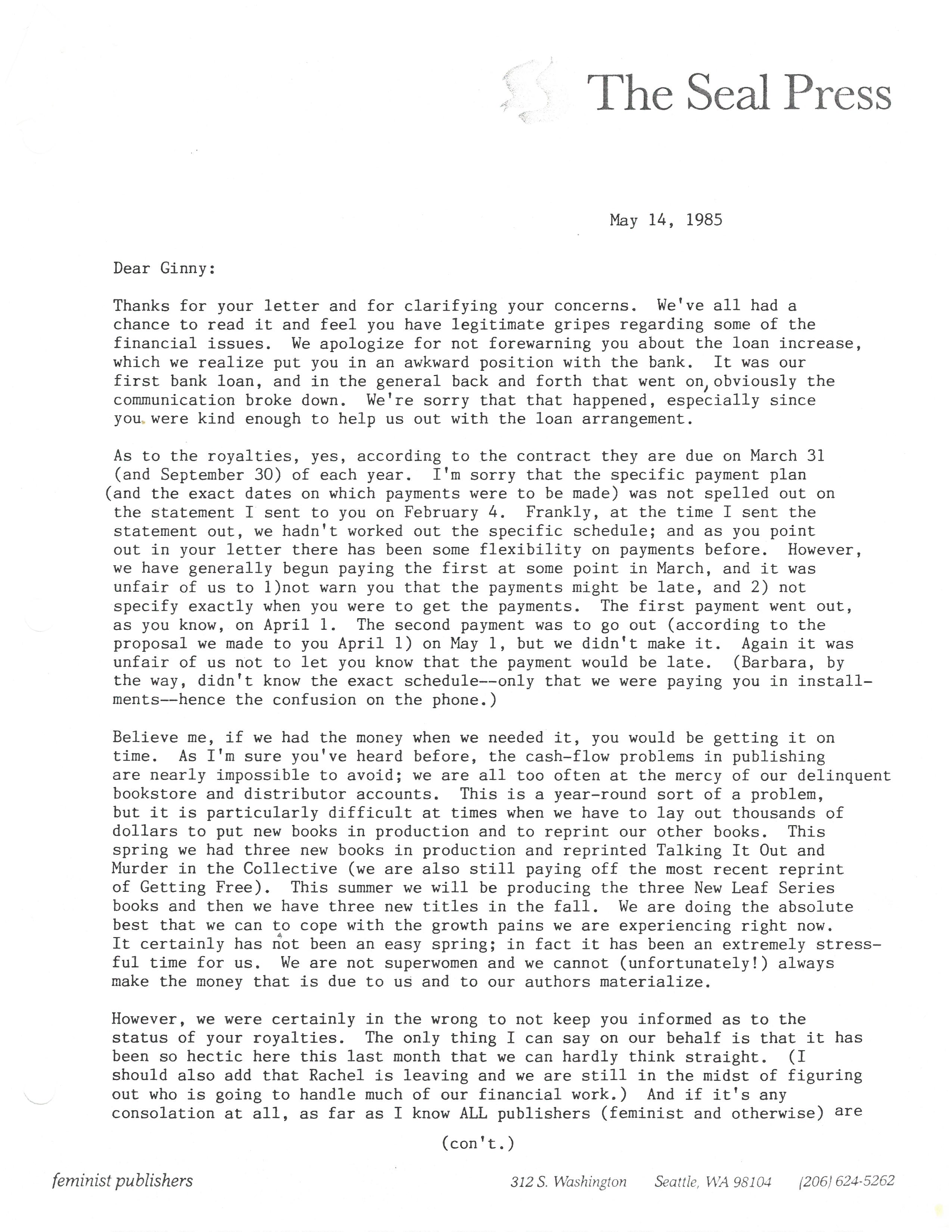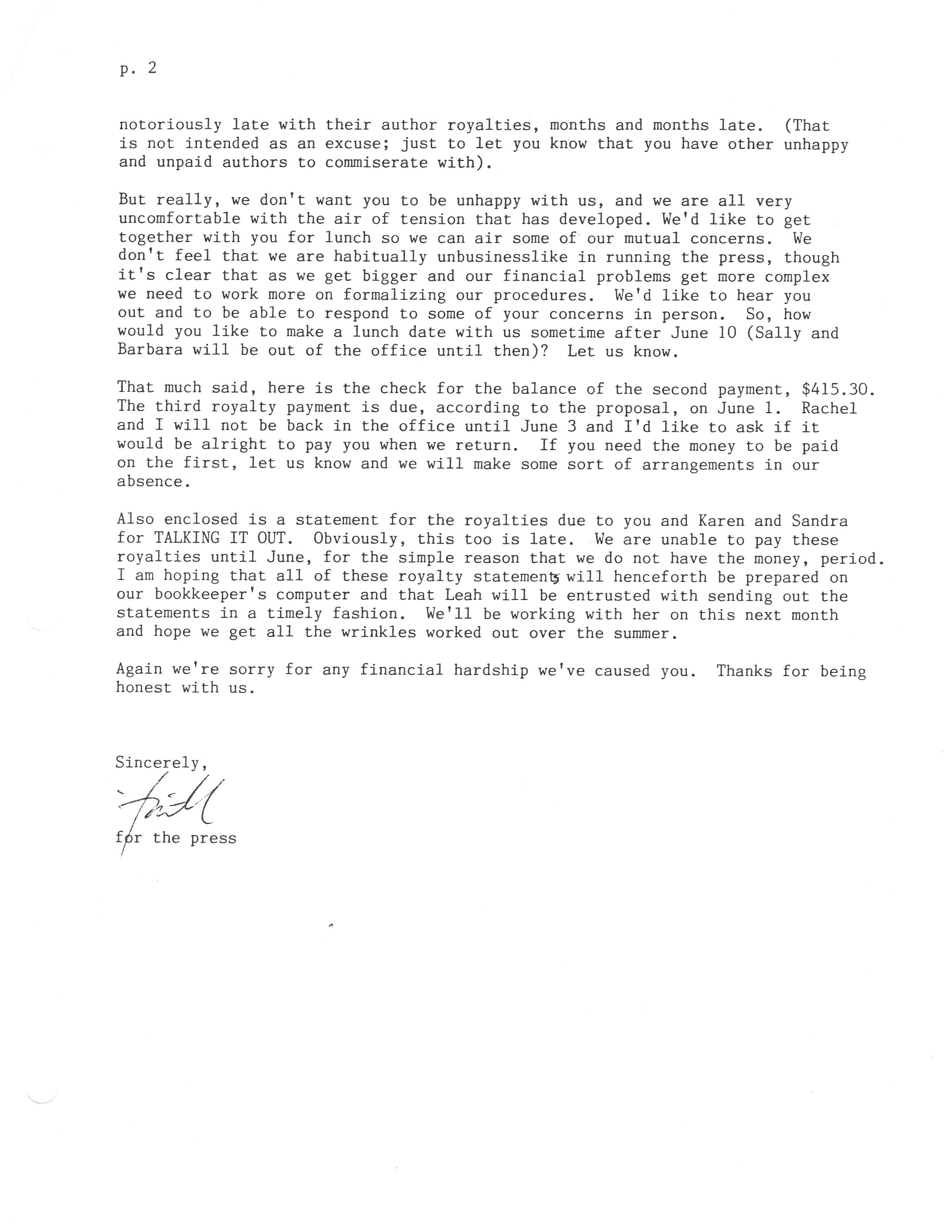|
|
Transcription: The Seal Press [Letterhead: feminist publishers 312 S. Washington Seattle, WA 98104 (206) 624-5262] May 14, 1985 Dear Ginny: Thanks for your letter and for clarifying your concerns. We’ve all had a chance to read it and feel you have legitimate gripes regarding some of the financial issues. We apologize for not forewarning you about the loan increase, which we realize put you in an awkward position with the bank. It was our first bank loan, and in the general back and forth that went on, obviously the communication broke down. We’re sorry that happened, especially since you were kind enough to help us out with the loan arrangement. As to the royalties, yes, according to the contract they are due on March 31 (and September 30) of each year. I’m sorry that the specific payment plan (and the exact dates on which payments were to be made) was not spelled out on the statement I sent to you on February 4. Frankly, at the time I sent the statement out, we hadn’t worked out the specific schedule; and as you point out in your letter there has been some flexibility on payments before. However, we have generally begun paying the first at some point in March, and it was unfair of us to 1) not warn you that the payments might be late, and 2) not specify exactly when you were to get the payments. The first payment went out, as you know, on April 1. The second payment was to go out (according to the proposal we made to you April 1) on May 1, but we didn’t make it. Again it was unfair of us not to let you know that the payment would be late. (Barbara,[1] by the way, didn’t know the exact schedule–only that we were paying you in installments–hence the confusion on the phone.) Believe me, if we had the money when we needed it, you would be getting it on time. As I’m sure you’ve heard before, the cash-flow problems in publishing are nearly impossible to avoid; we are all too often at the mercy of our delinquent bookstore and distributor accounts. This is a year-round sort of a problem, but it is particularly difficult at times when we have to lay out thousands of dollars to put new books in production and to reprint our other books. This spring we had three new books in production and reprinted Talking It Out[2] and Murder in the Collective[3] (we are also still paying off the most recent reprint of Getting Free[4]). This summer we will be producing the three New Leaf Series[5] books and then we have three new titles in the fall. We are doing the absolute best that we can to cope with the growth pains we are experiencing right now. It certainly has not been an easy spring; in fact it has been an extremely stressful time for us. We are not superwomen and we cannot (unfortunately!) always make the money that is due to us and to our authors materialize. However, we were certainly in the wrong to not keep you informed as to the status of your royalties. The only thing I can say on our behalf is that it has been so hectic here this last month that we can hardly think straight. (I should also add that Rachel[6] is leaving and we are still in the midst of figuring out who is going to handle much of our financial work.) And if it’s any consolation at all, as far as I know ALL publishers (feminist and otherwise) are notoriously late with their author royalties, months and months late. (That is not intended as an excuse; just to let you know that you have other unhappy and unpaid authors to commiserate with). But really, we don’t want you to be unhappy with us, and we are all very uncomfortable with the air of tension that has developed. We’d like to get together with you for lunch so we can air some of our mutual concerns. We don’t feel that we are habitually unbusinesslike in running the press, though it’s clear that as we get bigger and our financial problems get more complex we need to work more on formalizing our procedures. We’d like to hear you out and to be able to respond to some of your concerns in person. So, how would you like to make a lunch date with us sometime after June 10 (Sally and Barbara will be out of the office until then)? Let us know. That much said, here is the check for the balance of the second payment, $415.30. The third royalty payment is due, according to the proposal, on June 1. Rachel and I will not be back in the office until June 3 and I’d like to ask if it would be alright to pay you when we return. If you need the money to be paid on the first, let us know and we will make some sort of arrangements in our absence. Also enclosed is a statement for the royalties due to you and Karen[7] and Sandra[8] for TALKING IT OUT. Obviously, this too is late. We are unable to pay these royalties until June, for the simple reason that we do not have the money, period. I am hoping that all of these royalty statement[s] will henceforth be prepared on our bookkeeper’s computer and that Leah[9] will be entrusted with sending out the statements in a timely fashion. We’ll be working with her on this next month and hope we get all the wrinkles worked out over the summer. Again we’re sorry for any financial hardship we’ve caused you. Thanks for being honest with us. Sincerely, faith[10] [sic] for the press Transcribed by Christina Ruggiero-Corliss |
[1] Barbara Wilson (now Sjoholm) (b. 1950) co-founded Seal Press with Rachel da Silva in 1976.
[2] Talking It Out: A Guide to Groups for Abused Women was written by Ginny NiCarthy, Karen Merriam, and Sandra Coffman and published by Seal Press in 1984 as part of their New Leaf Series on domestic abuse.
[3] Murder in the Collective, written by Barbara Wilson, is a lesbian mystery and detective story published by Seal Press in 1984.
[4] Getting Free by Ginny NiCarthy is a self-help guide for abused women, first published by Seal Press in 1982 with multiple reprints issued between then and 1997.
[5] New Leaf Series is a series of titles focused on domestic abuse published by Seal Press over the course of the 1980s.
[6] Rachel da Silva co-founded Seal Press with Barbara Wilson in 1976. She left the press in the years following Getting Free.
[7] Karen Merriam (dates unknown) co-authored Talking It Out.
[8] Sandra Coffman (dates unknown) co-authored Talking It Out.
[9] Leah Kosik (dates unknown) was Seal Press’ business manager from 1984-1991.
[10] Though this signature is difficult to decipher, the letter was likely signed by Faith Conlon (b. 1956), who officially joined Seal Press as Wilson’s co-publisher in 1982 following da Silva’s departure.

